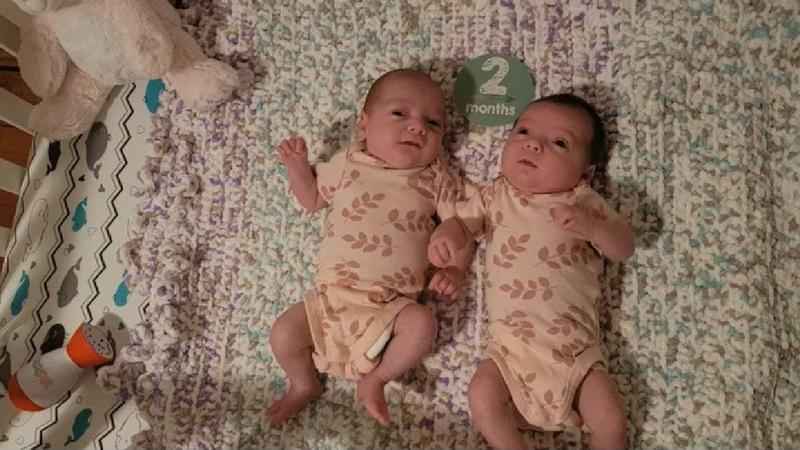Rare mono-mono twins born to North St. Paul parents at M Health Fairview Masonic Children’s Hospital
[anvplayer video=”5054207″ station=”998122″]
Emily Tate of North St. Paul was almost three months pregnant when she and her husband, Geoffrey Ilstrup, found out they were having twins.
At first, they were ecstatic, but soon after, the first-time parents found out they were in for another surprise, this one much scarier and not so welcome.
Doctors discovered Tate was having something called a monochorionic-monoamniotic, or mono-mono pregnancy. Other than conjoined twins, this is considered the rarest and highest-risk twin pregnancy. Tate was soon referred to a team of experts at M Health Fairview Maternal Medicine Clinic for care.
"I would estimate that one in 35,000 to 60,000 pregnancies are mono-mono," said maternal-fetal medicine physician Dr. Sarah Cross, medical director of The Birthplace at M Health Fairview University of Minnesota Masonic Children’s Hospital. "Mono-mono pregnancies require frequent, specialized ultrasounds to monitor the umbilical cords and the blood flow between fetuses."
Essentially, a mono-mono pregnancy means the twins both share a placenta and an amniotic sac during pregnancy.

Monochorionic-monoamniotic twins Lilith and Luna.[Family photo]
"It was pretty scary. She [the doctor] made it sounds serious but still positive, but then, of course, I did the thing you should never do when pregnant and then Googled it," Tate said.
She quickly found out about all the risks and complications that can come with a mono-mono pregnancy.
Tate was hospitalized at 24 weeks and monitored by a team of doctors and nurses around the clock at M Health Fairview Masonic Children’s Hospital.
"So much went through my mind of what could go wrong, what could happen, worried if they wouldn’t get the same kind of opportunities we had in life," Ilstrup said. "Your mind just goes running through everything until it happens and then you just work with what the outcome is and no matter what the outcome was, we were going to love them no matter what."
At 32 weeks, babies Lilith and Luna were delivered by cesarean section and then spent just shy of a month in the neonatal intensive care unit. Between Tate’s stay before giving birth and the babies’ time in the NICU, the family spent 45 days total at the hospital. Now both twins are home and healthy.
"I feel relieved. They’re such good babies," Tate said.